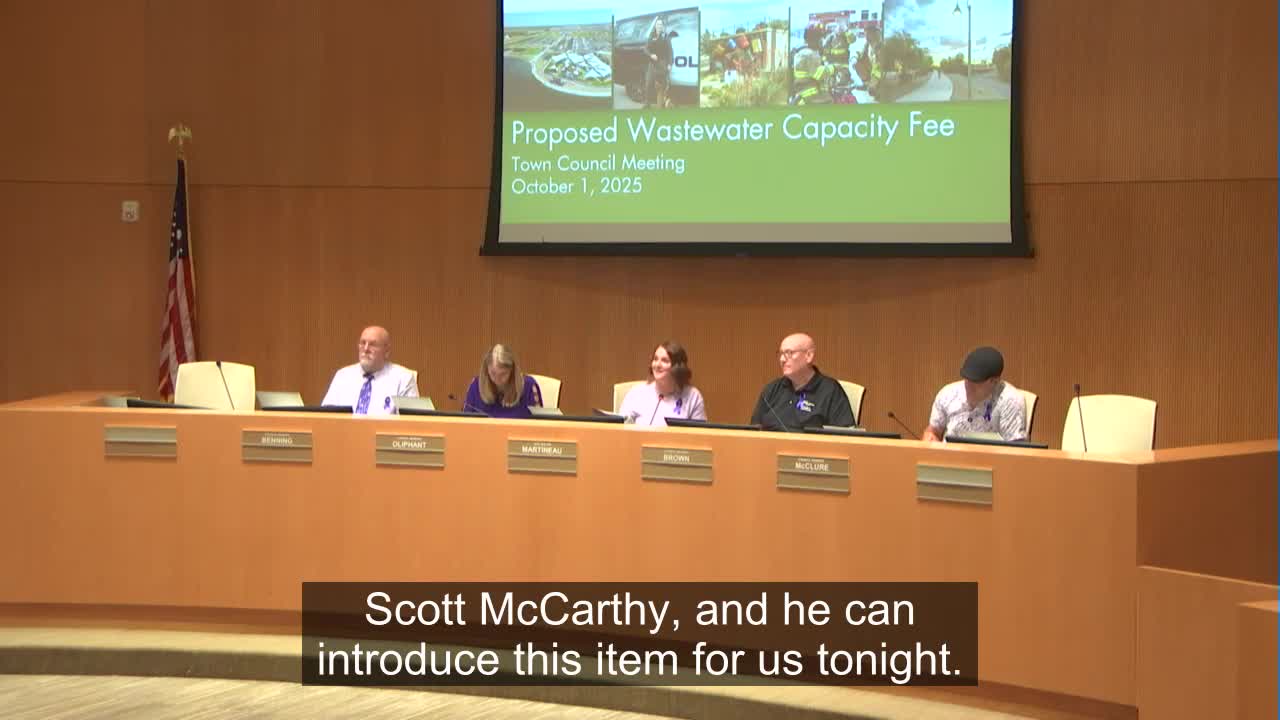Queen Creek council opens 60-day process to raise wastewater capacity fees, sets Dec. 3 public hearing
Get AI-powered insights, summaries, and transcripts
Subscribe
Summary
The Town Council voted 5-0 to publish a 60-day notice of intent to increase one-time wastewater capacity fees, proposing a roughly doubling of the per-household charge and methodology changes that would raise multifamily fees to 75% of single-family levels.
The Queen Creek Town Council voted 5-0 Wednesday to begin a 60-day public-notice process to raise the town’s one-time wastewater capacity fees and to set a public hearing for 6:30 p.m. Dec. 3, 2025. Council members also set a proposed effective date of Jan. 5, 2026, if the increase is later approved.
The increase responds to projected growth and the need to expand treatment capacity, council and staff said. Deputy Town Manager and CFO Scott McCarty told council members the update follows state law’s “fair and reasonable” standard and that the new calculation reflects costs tied to planned plant expansions and other infrastructure needed over a 10-year planning horizon.
“The fee essentially is a little bit more than doubling,” McCarty said, summarizing the recommendation staff will post for public review during the 60-day comment period.
Why it matters: Town staff and the town’s financial consultant said growth — mainly new single-family homes — will require additional treatment capacity. The study projects roughly 14,600 equivalent residential units (ERUs) over the next 10 years; at an industry-standard estimate of 168 gallons per ERU per day, that demand equals more than 2.5 million gallons per day of treatment capacity. The current fee package covers an expansion of about 2.0 million gallons per day; additional expansions are planned later as demand continues.
Consultants with DTA Public Finance and town staff laid out the cost components the fee would cover: a roughly $2.6 million lease payment to partner utilities for interim capacity, an 80% growth-attributable portion of the planned plant expansion (staff used an 80% growth allocation pending detailed design), about $6.6 million in transmission and buy-in improvements attributed to growth, and offsets from existing revenues and funding. The town also expects a $10 million contribution from state land to reduce the net fee.
DTA’s managing director (presenting for the town’s consultant) said the net result of those calculations and the revenue offsets yields a per-ERU fee of about $6,100 — roughly a 112% increase from the current per-household charge. “We’re able to determine a fee, per equivalent house, of about $6,100, which as you saw on the first slide is about a 112% increase on the fee,” the consultant said.
Staff emphasized two methodology changes that could materially affect how fees are assessed on different land uses. First, the town proposes treating multifamily residential at 75% of a single-family ERU, reflecting data showing multifamily households generate roughly three-quarters of the wastewater of a single-family home. The change responds to observed inconsistencies in past fee assessments where meter-size–based fees produced wide per-unit disparities among multifamily projects.
Second, for larger commercial/industrial connections (meter sizes at or above 2 inches), staff recommended a project-specific flow analysis rather than a simple meter-size proxy. The consultant showed examples where meter-size methodology underestimates actual annual flows; under the proposed change, projects whose measured or estimated flows exceed the baseline would pay a higher, project-specific fee.
Council members asked about timing and fairness. Councilmember McClure noted the multi-year lead time to design and build treatment facilities and sought confirmation that planning must begin several years before capacity is exhausted. McCarty agreed, citing a five-year timeline from planning to operation for treatment-plant expansions and said staff is already evaluating eastern-site options for an advanced treatment facility.
Councilmember Brown asked whether prior undercollection from multifamily projects created a subsidy for other customers. Staff explained that past methodology and growing multifamily development had accelerated capacity use relative to earlier assumptions, and the updated methodology and periodic fee updates will better align costs with the actual demand created by each land use.
Home Builders Association representative James Ashley said the association appreciates the town’s stakeholder outreach and intends to continue working with staff on implementation details and ways to mitigate near-term impacts.
The council approved a motion — read into the record — to post a 60-day notice of the proposed fee changes, publish the notice at least 20 days before the public hearing, and hold the public hearing on Dec. 3, 2025. The motion passed unanimously, 5-0.
Next steps: Under state statute, the town must run a 60-day notice period before the public hearing; after the hearing, if council approves the increase a 30-day waiting period applies before the fee becomes effective. Staff recommended following that timetable with an earliest effective date of Jan. 5, 2026, if council adopts the fee at the Dec. 3 hearing and complies with the statutory waiting period.
Staff and the consultant also said they will continue stakeholder meetings during the 60-day period, with a particular focus on multifamily representatives and building-industry partners to discuss implementation timing and mitigation options.
